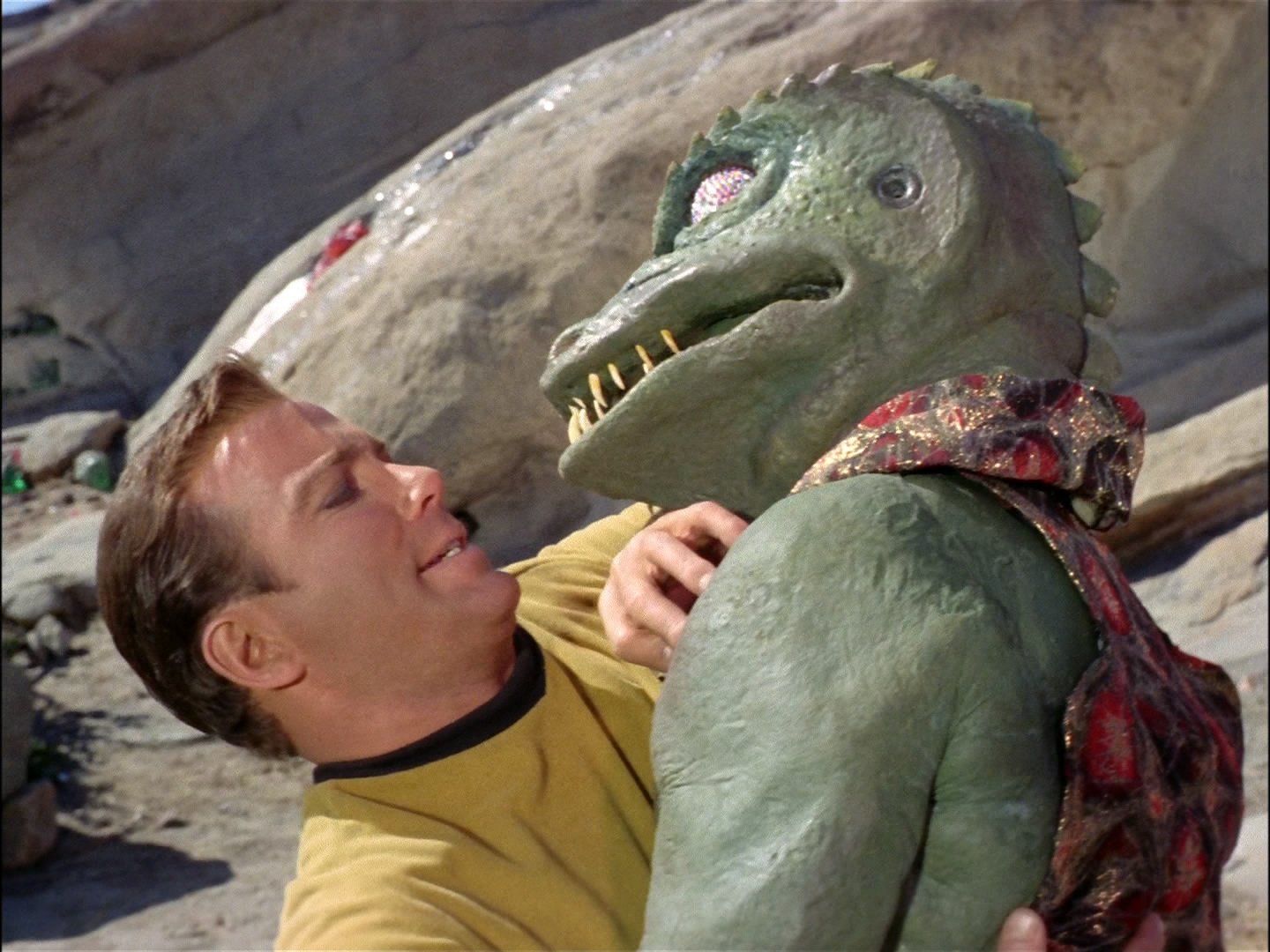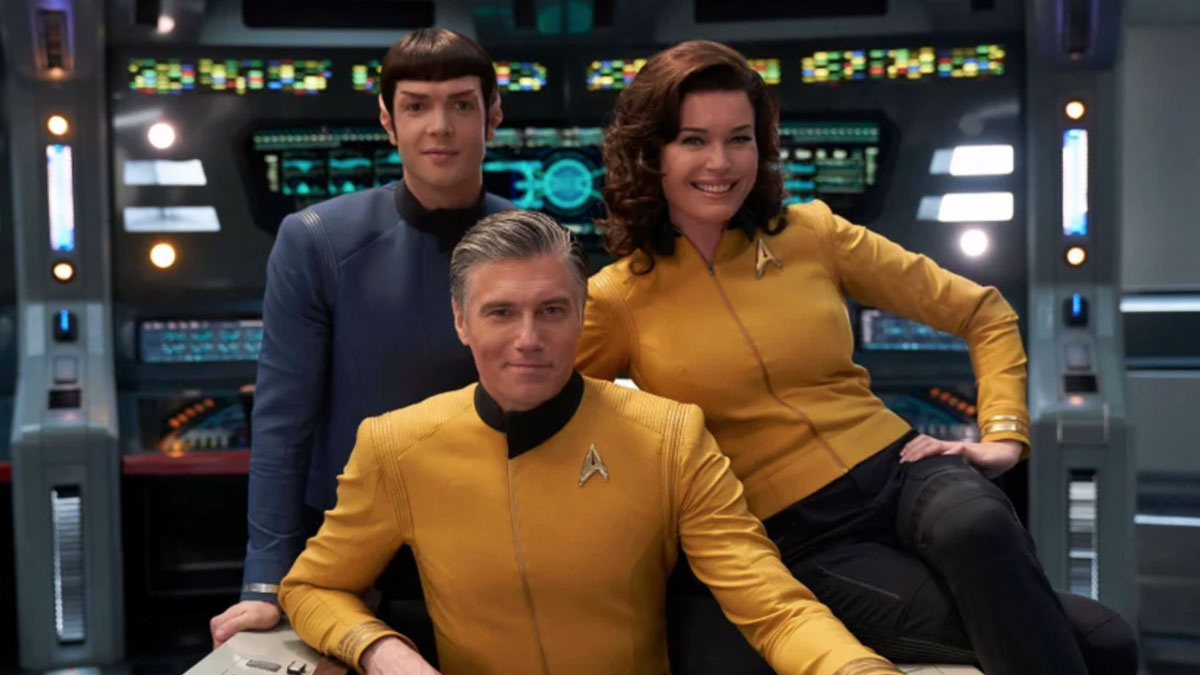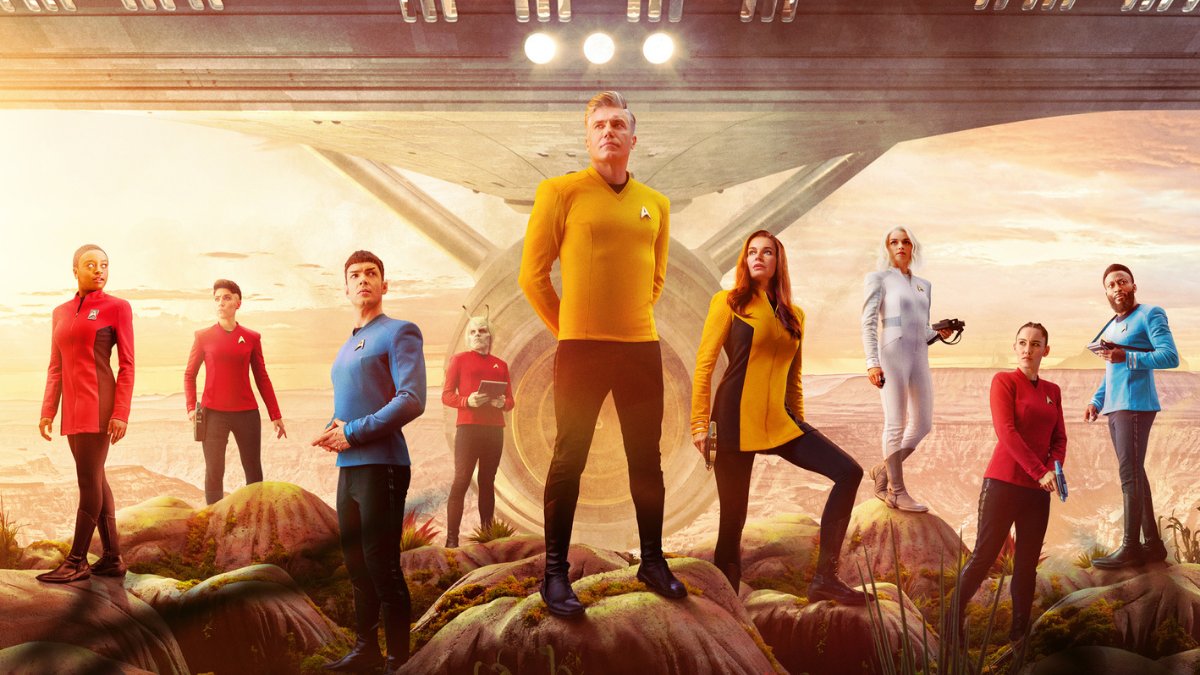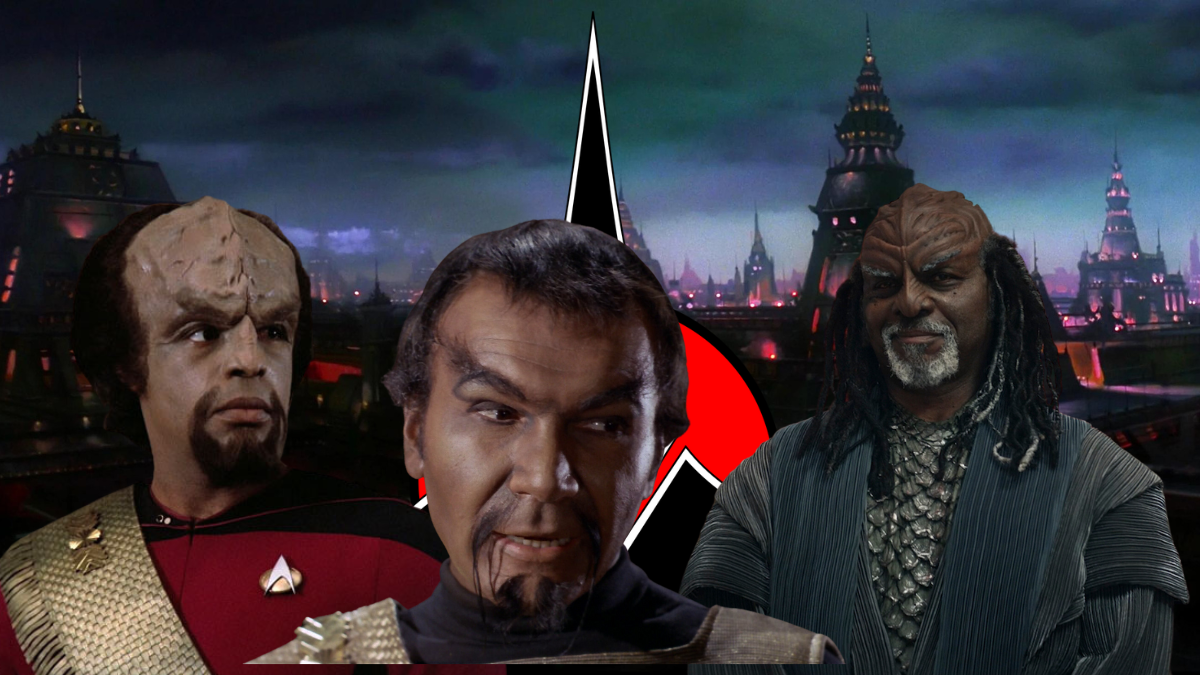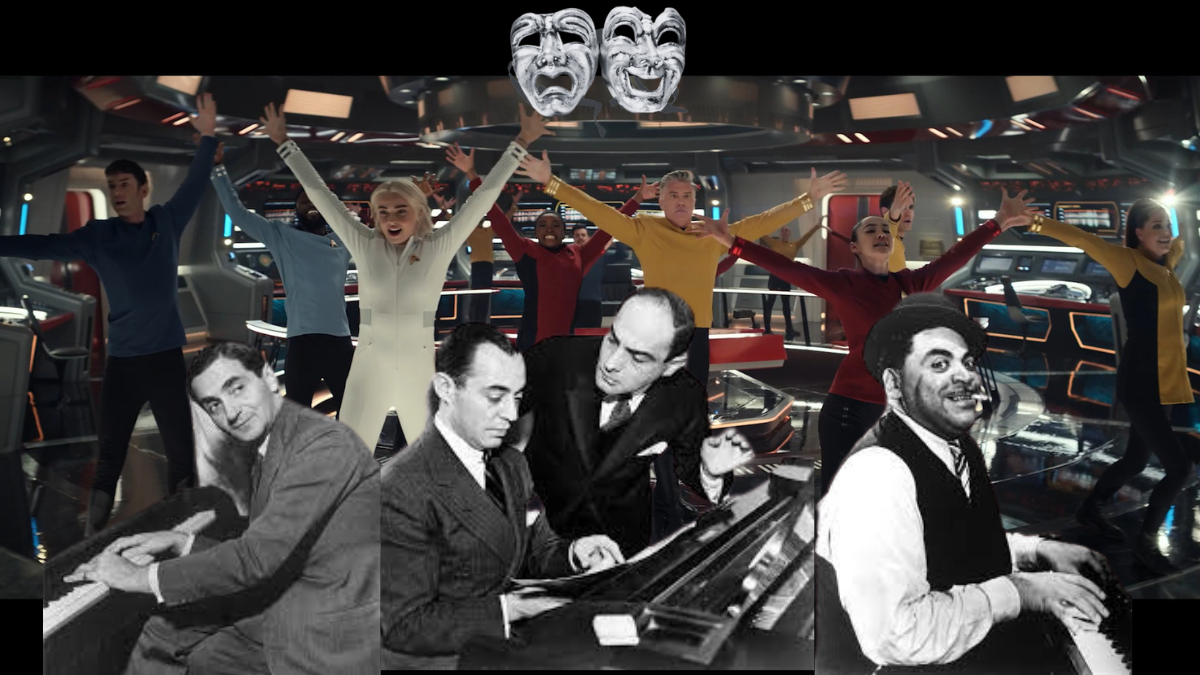Gorn But Not Forgotten: How a Silly-Looking 'Star Trek' Creature Became a Cultural Icon
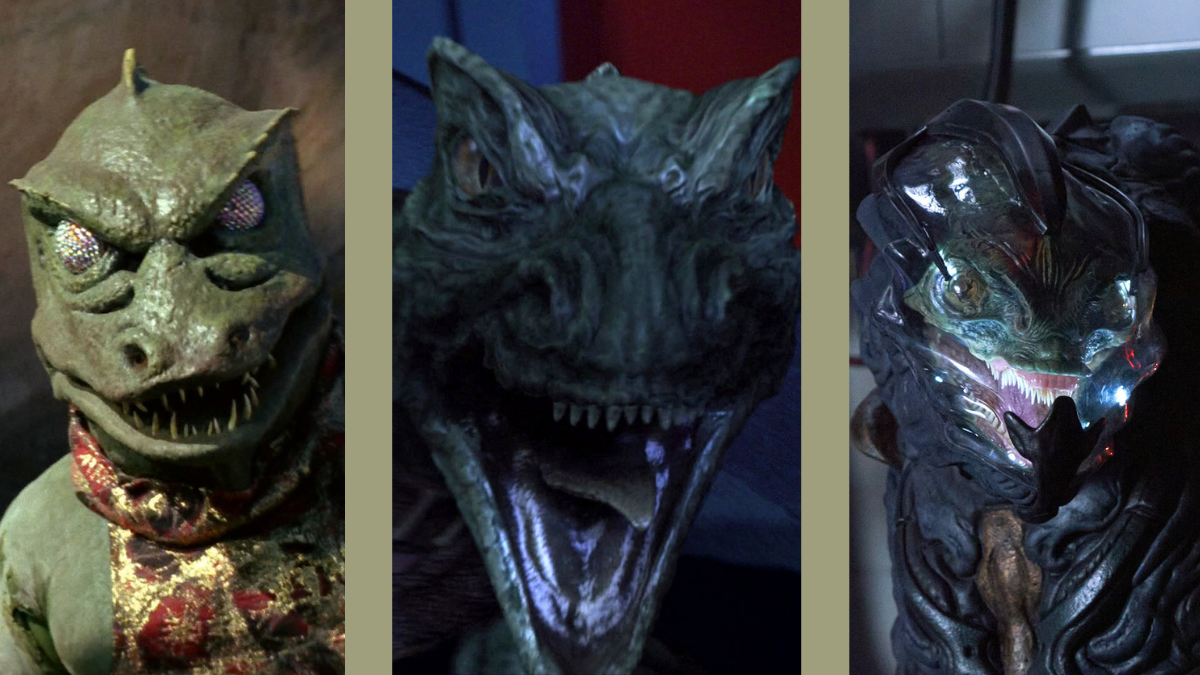
The three live-action iterations of the Gorn. Images: Paramount.
SPOILER WARNING: This article goes into details about the latest Star Trek: Strange New Worlds episode, “Hegemony.”
AUGUST 17, 2023 - I have a friend who refuses to watch Star Trek. Every time he’s ever turned on an episode, he claims, it’s the same one: William Shatner (Captain Kirk) is stranded on a planet engaged in a slow-motion battle with a lizard creature in a terrible costume. My friend just can’t stomach a series that seems to have only one episode with such unrealistic special effects.
With all due respect to my friend, he’s missing the point. It’s true, creature makeup at the time “Arena” and the other 78 episodes of the original Star Trek were made was in its infancy, and Trek was already stretching a small television budget to transport its viewers to strange new worlds every week. The limitations of 1960s television are on full display in “Arena,” and if, with no other knowledge of the series, you happen to jump into the middle of the episode with Bobby Clark, Gary Combs, and Bill Blackburn alternating in an uncomfortable-looking lizard suit taking slow, wild swings at Shatner, who ducks them with room to spare, you might wonder what the appeal is.
But Star Trek has never been about aliens or special effects. From the very first, it’s been about the human condition and telling good stories through those characters and effects. Whether you’re nostalgic for the cheesy look of the original Gorn or abhor it, you probably recognize it from myriad references throughout pop culture.
A Gorn is Born
If you’ve ever seen Bill & Ted’s Bogus Journey (1991) or that one Trek-centric Mythbusters episode or certain episodes of The Big Bang Theory or Family Guy, you’re aware of “Arena” and the Gorn. And even if you haven’t, chances are that you’ve stumbled across the Gorn’s likeness online, probably in a meme.
Beyond question, the distinct unbelievability of the costume is what has made the Gorn so recognizable throughout the past 55 years. The look was created by legendary designer, sculptor, and artist Wah Chang, who also designed TOS’ salt vampire costume (“The Man Trap”) and the Romulan Bird of Prey (“Balance of Terror”), among other props and costumes, and whose design for the communicator is often cited as the inspiration for flip phones.
The problem Chang faced was creating a lizard creature as scripted and making it look believable. The costume he came up with was bulky, hot, and difficult to maneuver in, but it definitely looked distinctly alien. The Gorn wasn’t a humanoid species with a funny forehead or pointy ears. It was something truly unique, a big swing for the costume department, and it largely paid off, despite the derision the design has inspired.
It was important for the story of “Arena” that the Gorn wasn’t recognizably human. A Federation colony is attacked by the monstrous species who, it turns out, has a right to the planet upon which the humans have settled. When Kirk and the Gorn captain are pitted against each other by a third alien race, the Metrons, Kirk is forced to MacGyver together a rudimentary cannon to take his nemesis out. In the end, though, the scales fall from his eyes and he chooses mercy over killing the sentient lizard, realizing that its grievance against the Federation is legitimate and he even suggests that the Federation and Gorn may one day reach a treaty.
The episode displays an early example of a common Star Trek theme: even those aliens who don’t look like us humans may not be monsters on the inside. Often overlooked is the fact that the Gorn chose to destroy a Federation outpost rather than talk to the human interlopers. That and the fact that the Metrons, while espousing a message of mercy, are, in their own way, just as bloodthirsty as the Gorn and, to some extent, the humans, is a subject for another article. The point is, to support the episode’s thesis, the Gorn needed to look completely alien. Chang’s design achieved that with the techniques available to him at the time.
Gorn Again
It was almost 40 years later that Star Trek revisited the Gorn in “live-action,” in the Star Trek: Enterprise episode “In a Mirror, Darkly, Part II.” Although computer-generated imagery (CGI) had been used in films for years (the first time being in Star Trek II: The Wrath of Khan [1982]) and digital characters specifically had been used many times (starting with Young Sherlock Holmes [1985]), by 2005 digital animation was still in its infancy and relatively tiny television budgets precluded it from being widely used in the media. But when the decision was made to include a Gorn character in one of the final ENT episodes, it was decided that digital was the way to go.
This time it was stunt coordinator Vince Deadrick, jr. who suited up, not in a bulky costume, but in a form-fitting black leotard with white grid marks. The footage of the stuntman acting alongside Scott Bakula (Captain Archer) was then replaced by the digital lizard. The character certainly moved faster and in a more menacing fashion, but otherwise the effect left much to be desired and seemed a bit silly in its own way.
Furthermore, this Gorn seemed to only appear as a gratuitous reference. The battle on the mirror universe ship did nothing to further the episode’s story, nor did we learn anything new about the Gorn as a species. The creative team behind the episode either missed the original point of the species or simply ignored it altogether.
The Gorn made their next appearance in Star Trek: Lower Decks’ season one episode “Veritas.” The animation was inspired by the original look of the Gorn, but they only appeared briefly as a gag, so there’s no need to dive too deep into the appearance here. It was the second time the Gorn had been animated, the first being in the 1973 Star Trek: The Animated Series episode “The Time Trap,” but other than a few brief shots, there was really nothing new to be learned about the species.
Gorn To Be Wild
Which brings us to Star Trek: Strange New Worlds. It’s now been nearly 60 years since a Gorn first slowly swung a punch at Captain James T. Kirk, and the world hasn’t forgotten them. From the first season of SNW, it’s been clear the Gorn would be an integral part of the series. La’an Noonien-Singh’s (Christina Chong) history with the species was mentioned early on and there were a couple of episodes in that season that established their ferocity, first in a space battle in “Memento Mori,” and then when Chief Engineer Hemmer (Bruce Horak) was killed by them in “All Those Who Wander.”
In the season two finale of the show, “Hegemony,” the Enterprise crew encounters the Gorn on Parnassus Beta. As with “All Those Who Wander,” the episode is a horror story, and very well told. With each episode we’re learning more about the Gorn. The show is setting them up as true monsters. As co-Executive Producer Akiva Goldsman told Inverse,
…our Gorn are real monsters. Compassion and empathy, are the driving themes and intent for our show. But, we also wanted to say that those things don't preclude the existence of monsters. So, that’s the role the Gorn have currently on our show. I'm a believer in kindness, connection, and understanding. I also believe there are monsters out there. And it's our job to show both.
So does that mean that, like my friend who is distracted by the cheesy costume or the ENT writers who gratuitously shoehorned an appearance of the creature into their late-series episode, the SNW team has missed the point? I don’t think so.
The Gorn in SNW arguably look better than any iteration that’s come before, thanks to Legacy Effects and their co-owner, J. Alan Scott. They used a blend of practical and digital effects, combining the two techniques to design a creature that honors the legacy of the Gorn while creating something new and more realistic.
But what about Goldsman’s assertion that the Gorn are monsters? That certainly seems to go against the original story purpose of the creatures. But not really. The Gorn were clearly never saints. They could have opened negotiations with the Federation instead of destroying the outpost. Before Kirk began to understand the Gorn, he thought of them simply as antagonistic creatures to be hunted and destroyed. It’s unclear how much humans know about the Gorn by the time “Arena” begins. So canon isn’t necessarily being broken here, just bent a little.
And what it comes down to is storytelling. The Gorn’s appearances in SNW are certainly better thought-out than the one in ENT, and they look more realistic than they ever have before. What the creative team does with the Gorn going forward is still a matter of conjecture, but whatever they decide, I’ll be along for the ride.
T is the Managing Editor for Daily Star Trek News and a contributing writer for Sherlock Holmes Magazine and a Shakespeare nerd. He may have been the last professional Stage Manager to work with Leonard Nimoy, has worked Off-Broadway and regionally, and is the union Stage Manager for Legacy Theatre, where he is currently working with Julie Andrews. after which he’ll be working on Richard III at Elm Shakespeare Company.


